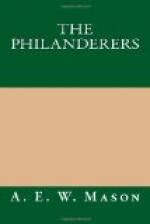‘I don’t understand.’
‘Well, I had an idea of persuading Fielding to go with me.’ He blurted the proposal brusquely. ’He’s interested, you see, in the success of the colony, and—well, altogether, I didn’t think it would be a bad thing.’
Mrs. Willoughby walked to the window and looked out of it for a few seconds. ‘What does Mr. Fielding say?’ she asked.
’I haven’t broached the subject to him yet. I thought I wouldn’t before—’ He stopped and made no effort to finish the sentence.
‘It’s a year,’ she said slowly, lengthening out the word. ’Yes, only a year,’ said he briskly, and Mrs. Willoughby smiled in spite of herself. She thought of the new air of alertness which Fielding had worn since his return from Switzerland. She came back to Drake and held out her hand to him. ‘You think very wisely for your friends,’ she said.
‘It’s an inspiriting business to see a community in the making,’ he answered; ’especially when there’s money to help it to make itself quickly.’
He wished her good-bye and moved to the door. As he opened it he said, ‘By the way, is the date of the marriage fixed?’ but without turning towards her.
She said, ‘Yes, the 8th of December,’ and she saw his shoulders brace, and the weight of his body come backwards from the ball of the foot on to the heel.
‘Ah! I shall be in Africa by then,’ he said.
It was in fact near upon the end of February that the river-steamer plying between the settlement and the coast of Matanga brought to Drake and Fielding an announcement that the marriage had taken place. There were letters for both the men, and they carried them out to a grass knoll on the edge of the forest some quarter of a mile away from the little village of tin huts which shone in the sunshine like a tidy kitchen, as Fielding was used to say. Drake read his through, and said to Fielding, ‘You have a letter from Mrs. Willoughby?’
‘Yes.’
‘Any news?’
Fielding looked him in the face. ‘Yes,’ he said slowly, and putting the letter in his pocket, buttoned it up. Drake understood alike from his tone and action what news the letter conveyed, and made no further inquiry. He fell instead to talking of some machinery which the boat had brought up along with the letters. The letter, indeed, was written in a vein which made it impossible for Fielding to follow the usual habit of reading Mrs. Willoughby’s letters aloud to his companion. ‘The wedding,’ she wrote, ’lacked nothing but a costumier and a composer. The bride and bridegroom should have been in fancy dress, and a new Gounod was needed to compose the wedding-march of a marionette. One might have taken the ceremony seriously as an artistic whole under those circumstances.’
Mrs. Willoughby continued to keep Fielding informed of the progress or the married couple, and in May hinted at dissensions. The hint Fielding let slip one day to Drake. Drake, however, received the news with apparent indifference, and indeed returned to England in September with Fielding without having so much as referred to the subject.




